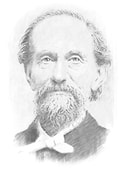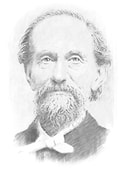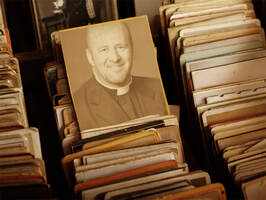Luke 11
|
Luke 11:1:
And it came to pass, that, as he was praying in a certain place, when he ceased, one of his disciples said unto him, Lord, teach us to pray, as John also taught his disciples. |
Jesus: "Watch and pray." Matt 26:41
Paul: "Pray without ceasing." I Thess 5:17 James: "Ye have no, because ye ask not" James 4:2 Paul: "I will therefore that men pray everywhere" I Tim 2:8 James: "The effectual fervent prayer of a righteous man availeth much" James 5:16 Jesus: "Whatever ye shall ask, in my name, that I will do." John 14:13 Jesus: "Ask, and it shall be given you; seek and ye shall find; knock, and it shall be opened unto you." Matt 7:7 |
 Andrew Murray
Andrew Murray
“Jesus never taught His disciples how to preach, only how to pray. He did not speak much of what was needed to preach well, but much of praying well. To know how to speak to God is more than knowing how to speak to man. Not power with men, but power with God is the first thing. Jesus loves to teach us how to pray.”
― Andrew Murray, Lord, Teach Us To Pray
 Andrew Murray
Andrew Murray
“Oh, that you would come and begin simply to listen to His Word and to ask only the one question: Does He really mean that I should abide in Him? The answer His Word gives is so simple and so sure: By His almighty grace you now are in Him; that same almighty grace will indeed enable you to abide in Him. By faith you became partakers of the initial grace; by that same faith you can enjoy the continuous grace of abiding in Him.”
― Andrew Murray, Abide in Christ: The Joy of Being in God's Presence
― Andrew Murray, Abide in Christ: The Joy of Being in God's Presence
|
Luke 11:2:
And he said unto them, When ye pray, say, Our Father which art in heaven, Hallowed be thy name. Thy kingdom come. Thy will be done, as in heaven, so in earth. |
Gal 4:6 (NIV) Because you are sons, God sent the Spirit of his Son into our hearts, the Spirit who calls out "Abba, Father".
|

There has been no controversy or doubt, then or now, about what Jesus said. Matthew and Luke agree down to every Greek stroke: hagiasthētō to onoma sou (Matthew 6:9; Luke 11:2). In English, Wycliffe translated that line, in 1389, “Halwid be thi name.” More than a century later, in 1526, Tyndale did the same: “Halowed be thy name.” The King James Version followed suit in 1611: “Hallowed be thy name.”
The verb (hagiazō, to treat as holy) appears 28 times in the New Testament, with its noun and adjective forms occurring more than 300 times (400 more in the Old Testament). Hallow, which means to consecrate or set apart or honor as holy, has fallen largely into disuse today. Annually we mark Halloween, and sometimes we refer to hallowed grounds, but we do not hallow. Not like we once did. As far back as 250 years ago, in 1768, Benjamin Franklin sensed the problem and rendered this paraphrase of the line: “May all revere thee.”
When Jesus begins his model prayer with “hallowed be your name,” what is he asking? Father, may you set your name apart from every other name. Cause your reputation to be esteemed and reverenced and treasured above all others. Glorify your name. When we hear the Son of God pray like this, we should not be surprised. He is not the first to appeal to God’s name, to his honor and glory, as the rock-bottom ground for God’s action. Nor should he be the last. -David Mathis; Desiring God
The verb (hagiazō, to treat as holy) appears 28 times in the New Testament, with its noun and adjective forms occurring more than 300 times (400 more in the Old Testament). Hallow, which means to consecrate or set apart or honor as holy, has fallen largely into disuse today. Annually we mark Halloween, and sometimes we refer to hallowed grounds, but we do not hallow. Not like we once did. As far back as 250 years ago, in 1768, Benjamin Franklin sensed the problem and rendered this paraphrase of the line: “May all revere thee.”
When Jesus begins his model prayer with “hallowed be your name,” what is he asking? Father, may you set your name apart from every other name. Cause your reputation to be esteemed and reverenced and treasured above all others. Glorify your name. When we hear the Son of God pray like this, we should not be surprised. He is not the first to appeal to God’s name, to his honor and glory, as the rock-bottom ground for God’s action. Nor should he be the last. -David Mathis; Desiring God
|
Luke 11:3-4:
3 Give us day by day our daily bread. 4 And forgive us our sins; for we also forgive every one that is indebted to us. And lead us not into temptation; but deliver us from evil. |

“Give us this day our daily bread”
The focus of the Lord’s Prayer clearly shifts from God to our own basic needs with this petition—and not simply to “my needs,” but to “our needs.” The plural pronoun is significant. In fact, for many, it’s hard to imagine saying, “Give me this day my daily bread.” In this petition, we’re asking God to supply the basics of what’s necessary for us to survive and find satisfaction and meaning. Since basic necessities go beyond literal, actual bread, this petition affirms our reliance on God to meet our most basic needs from one day to the next. Like the Hebrews who would have starved had God not sent the gift of manna daily (Exodus 16), we, too, would die without the daily, mundane, essential gifts that sustain these fragile, dependent lives that are precious to God. -Stephanie Soderstrom |
In this version of the Lord’s Prayer (Luke 11:2–4), Jesus says, “When you pray, say . . . ” and then in verse 4 he includes this petition, “and forgive us our sins.” So, if you connect the beginning of the prayer with the middle, what he says is, “Whenever you pray, say . . . forgive us our sins.”
I take this to mean that this should be as much a part of all our praying as, “Hallowed be your name.” Which means that Jesus assumes that we need to seek forgiveness virtually every time we pray.
-John Piper; Desiring God
I take this to mean that this should be as much a part of all our praying as, “Hallowed be your name.” Which means that Jesus assumes that we need to seek forgiveness virtually every time we pray.
-John Piper; Desiring God

With the fourth petition, we are invited to turn to God in the small (relative to the coming of the kingdom! Luke 4:4) but urgent matters of our lives and, like the ravens and lilies, learn to trust in the Father’s mercies new every morning because the Father knows already what we need (12:22-24, 29-31). The prayer recognizes that we do need the essentials of life day by day, but only enough, not dangerous excess. Inherent in the petition is a hope that we will neither fret nor hoard, but beyond that is a desire to be so fully present in the small day-to-day things of life that we will be able to sense Jesus’ presence even in the breaking of our bread (22:19; 24:30-35). -Meda Stamper; Working Preacher
Luke 11:4-10:
And forgive us our sins; for we also forgive every one that is indebted to us. And lead us not into temptation; but deliver us from evil.
5 And he said unto them, Which of you shall have a friend, and shall go unto him at midnight, and say unto him, Friend, lend me three loaves;
6 For a friend of mine in his journey is come to me, and I have nothing to set before him?
7 And he from within shall answer and say, Trouble me not: the door is now shut, and my children are with me in bed; I cannot rise and give thee.
8 I say unto you, Though he will not rise and give him, because he is his friend, yet because of his importunity he will rise and give him as many as he needeth.
9 And I say unto you, Ask, and it shall be given you; seek, and ye shall find; knock, and it shall be opened unto you.
10 For every one that asketh receiveth; and he that seeketh findeth; and to him that knocketh it shall be opened.
And forgive us our sins; for we also forgive every one that is indebted to us. And lead us not into temptation; but deliver us from evil.
5 And he said unto them, Which of you shall have a friend, and shall go unto him at midnight, and say unto him, Friend, lend me three loaves;
6 For a friend of mine in his journey is come to me, and I have nothing to set before him?
7 And he from within shall answer and say, Trouble me not: the door is now shut, and my children are with me in bed; I cannot rise and give thee.
8 I say unto you, Though he will not rise and give him, because he is his friend, yet because of his importunity he will rise and give him as many as he needeth.
9 And I say unto you, Ask, and it shall be given you; seek, and ye shall find; knock, and it shall be opened unto you.
10 For every one that asketh receiveth; and he that seeketh findeth; and to him that knocketh it shall be opened.

"That story," said Jesus, "will tell you about prayer." The lesson of this parable is not that we must persist in prayer; it is not that we must batter at God's door until we finally compel him for very weariness to give us what we want, until we coerce an unwilling God to answer.
A parable literally means something laid alongside. If we lay something beside another thing to teach a lesson, that lesson may be drawn from the fact that the things are like each other or from the fact that the things are a contrast to each other. The point here is based, not on likeness, but on contrast. What Jesus says is, "If a churlish and unwilling householder can in the end be coerced by a friend's shameless persistence into giving him what he needs, how much more will God who is a loving Father supply all his children's needs?" "If you," he says, "who are evil, know that you are bound to supply your children's needs, how much more will God?"
This does not absolve us from intensity in prayer. After all, we can guarantee the reality and sincerity of our desire only by the passion with which we pray. But it does mean this, that we are not wringing gifts from an unwilling God, but going to one who knows our needs better than we know them ourselves and whose heart towards us is the heart of generous love. If we do not receive what we pray for, it is not because God grudgingly refuses to give it but because he has some better thing for us. There is no such thing as unanswered prayer. The answer given may not be the answer we desired or expected; but even when it is a refusal it is the answer of the love and the wisdom of God. -Barclays
A parable literally means something laid alongside. If we lay something beside another thing to teach a lesson, that lesson may be drawn from the fact that the things are like each other or from the fact that the things are a contrast to each other. The point here is based, not on likeness, but on contrast. What Jesus says is, "If a churlish and unwilling householder can in the end be coerced by a friend's shameless persistence into giving him what he needs, how much more will God who is a loving Father supply all his children's needs?" "If you," he says, "who are evil, know that you are bound to supply your children's needs, how much more will God?"
This does not absolve us from intensity in prayer. After all, we can guarantee the reality and sincerity of our desire only by the passion with which we pray. But it does mean this, that we are not wringing gifts from an unwilling God, but going to one who knows our needs better than we know them ourselves and whose heart towards us is the heart of generous love. If we do not receive what we pray for, it is not because God grudgingly refuses to give it but because he has some better thing for us. There is no such thing as unanswered prayer. The answer given may not be the answer we desired or expected; but even when it is a refusal it is the answer of the love and the wisdom of God. -Barclays
|
Luke 11:14-21:
14 And he was casting out a devil, and it was dumb. And it came to pass, when the devil was gone out, the dumb spake; and the people wondered. 15 But some of them said, He casteth out devils through Beelzebub the chief of the devils. 16 And others, tempting him, sought of him a sign from heaven. 17 But he, knowing their thoughts, said unto them, Every kingdom divided against itself is brought to desolation; and a house divided against a house falleth. 18 If Satan also be divided against himself, how shall his kingdom stand? because ye say that I cast out devils through Beelzebub. 19 And if I by Beelzebub cast out devils, by whom do your sons cast them out? therefore shall they be your judges. 20 But if I with the finger of God cast out devils, no doubt the kingdom of God is come upon you. 21 When a strong man armed keepeth his palace, his goods are in peace: |
It is by no means uncommon for people to resort to slander when honest opposition is helpless. Gladstone was interested in the reformation of the fallen women of the streets of London. His enemies suggested that he was interested in them for very different and very inferior reasons. There is nothing so cruel as slander, for it is apt to stick because the human mind always tends to think the worst and very often the human ear prefers to hear the derogatory rather than the complimentary tale. We need not think that we are free of that particular sin. How often do we tend to think the worst of other people? How often do we deliberately impute low motives to someone whom we dislike? How often do we repeat the slanderous and the malicious tale and murder reputations over the tea-cups? To think of this will not cause complacency but call for self-examination. -Barclays |

The best way to avoid evil is to do good. The loveliest garden I ever saw was so full of flowers that there was scarcely room for a weed to grow. In no garden is it enough to uproot weeds; flowers must be sown and planted until the space is filled. Nowhere is this truer than in the world of thoughts. Often we may be troubled with wrong thoughts. If we go no further than to say to ourselves, "I will not think about that," all we do is fix our thoughts upon it more and more. The cure is to think of something else, to banish the evil thought by thinking a good thought. We never become good by not doing things, but by filling life with lovely things. -Barclays
|
Luke 11:20-22:
But if I drive out demons by the finger of God, then the kingdom of God has come upon you. 21 When a strong man, fully armed, guards his own palace, his goods are in peace. 22 But when a stronger than he comes upon him and overcomes him, he takes from him all his armor in which he trusted, and divides his spoils. |
Under the third plague in Egypt--that of turning the dust into lice--the magicians, failing to duplicate it, said to Pharaoh, "This is the finger of God." (Ex 8:18-19)
|

Satan lay idle and luxuriated in deep repose. For what else had he to do but jest and sport, in tranquil and peaceable possession of his kingdom? Yet when the light shining from on high in a measure shattered his darkness, when that “strong man” had troubled and assailed his kingdom [cf. Luke 11:22], he began to shake off his accustomed drowsiness and to take up arms. And, first, indeed, he stirred up men to action that thereby he might violently oppress the dawning truth. And when this profited him nothing, he turned to stratagems: he aroused disagreements and dogmatic contentions through his catabaptists and other monstrous rascals in order to obscure and at last extinguish the truth.
John Calvin, Institutes of the Christian religion, ed. J. T. McNeill, trans. F. L. Battles (Westminster Press edn, Philadelphia, 1960), prefatory address to the King of France, p. 28.
John Calvin, Institutes of the Christian religion, ed. J. T. McNeill, trans. F. L. Battles (Westminster Press edn, Philadelphia, 1960), prefatory address to the King of France, p. 28.
|
Luke 11:23:
He who is not with Me is against Me |
|
Luke 11:28-36:
28 But he said, Yea rather, blessed are they that hear the word of God, and keep it.
29 And when the people were gathered thick together, he began to say, This is an evil generation: they seek a sign; and there shall no sign be given it, but the sign of Jonas the prophet.
30 For as Jonas was a sign unto the Ninevites, so shall also the Son of man be to this generation.
31 The queen of the south shall rise up in the judgment with the men of this generation, and condemn them: for she came from the utmost parts of the earth to hear the wisdom of Solomon; and, behold, a greater than Solomon is here.
32 The men of Nineve shall rise up in the judgment with this generation, and shall condemn it: for they repented at the preaching of Jonas; and, behold, a greater than Jonas is here.
33 No man, when he hath lighted a candle, putteth it in a secret place, neither under a bushel, but on a candlestick, that they which come in may see the light.
34 The light of the body is the eye: therefore when thine eye is single, thy whole body also is full of light; but when thine eye is evil, thy body also is full of darkness.
35 Take heed therefore that the light which is in thee be not darkness.
36 If thy whole body therefore be full of light, having no part dark, the whole shall be full of light, as when the bright shining of a candle doth give thee light.
28 But he said, Yea rather, blessed are they that hear the word of God, and keep it.
29 And when the people were gathered thick together, he began to say, This is an evil generation: they seek a sign; and there shall no sign be given it, but the sign of Jonas the prophet.
30 For as Jonas was a sign unto the Ninevites, so shall also the Son of man be to this generation.
31 The queen of the south shall rise up in the judgment with the men of this generation, and condemn them: for she came from the utmost parts of the earth to hear the wisdom of Solomon; and, behold, a greater than Solomon is here.
32 The men of Nineve shall rise up in the judgment with this generation, and shall condemn it: for they repented at the preaching of Jonas; and, behold, a greater than Jonas is here.
33 No man, when he hath lighted a candle, putteth it in a secret place, neither under a bushel, but on a candlestick, that they which come in may see the light.
34 The light of the body is the eye: therefore when thine eye is single, thy whole body also is full of light; but when thine eye is evil, thy body also is full of darkness.
35 Take heed therefore that the light which is in thee be not darkness.
36 If thy whole body therefore be full of light, having no part dark, the whole shall be full of light, as when the bright shining of a candle doth give thee light.
Luke 11:45-54:
45 Then answered one of the lawyers, and said unto him, Master, thus saying thou reproachest us also.
46 And he said, Woe unto you also, ye lawyers! for ye lade men with burdens grievous to be borne, and ye yourselves touch not the burdens with one of your fingers.
47 Woe unto you! for ye build the sepulchres of the prophets, and your fathers killed them.
48 Truly ye bear witness that ye allow the deeds of your fathers: for they indeed killed them, and ye build their sepulchres.
49 Therefore also said the wisdom of God, I will send them prophets and apostles, and some of them they shall slay and persecute:
50 That the blood of all the prophets, which was shed from the foundation of the world, may be required of this generation;
51 From the blood of Abel unto the blood of Zacharias which perished between the altar and the temple: verily I say unto you, It shall be required of this generation.
52 Woe unto you, lawyers! for ye have taken away the key of knowledge: ye entered not in yourselves, and them that were entering in ye hindered.
53 And as he said these things unto them, the scribes and the Pharisees began to urge him vehemently, and to provoke him to speak of many things:
54 Laying wait for him, and seeking to catch something out of his mouth, that they might accuse him.
45 Then answered one of the lawyers, and said unto him, Master, thus saying thou reproachest us also.
46 And he said, Woe unto you also, ye lawyers! for ye lade men with burdens grievous to be borne, and ye yourselves touch not the burdens with one of your fingers.
47 Woe unto you! for ye build the sepulchres of the prophets, and your fathers killed them.
48 Truly ye bear witness that ye allow the deeds of your fathers: for they indeed killed them, and ye build their sepulchres.
49 Therefore also said the wisdom of God, I will send them prophets and apostles, and some of them they shall slay and persecute:
50 That the blood of all the prophets, which was shed from the foundation of the world, may be required of this generation;
51 From the blood of Abel unto the blood of Zacharias which perished between the altar and the temple: verily I say unto you, It shall be required of this generation.
52 Woe unto you, lawyers! for ye have taken away the key of knowledge: ye entered not in yourselves, and them that were entering in ye hindered.
53 And as he said these things unto them, the scribes and the Pharisees began to urge him vehemently, and to provoke him to speak of many things:
54 Laying wait for him, and seeking to catch something out of his mouth, that they might accuse him.















